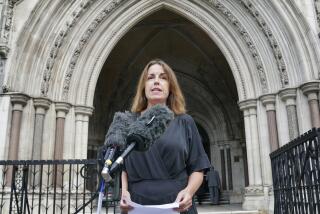Britain reveals role in two renditions
- Share via
LONDON — Britain, after years of denying a role in “extraordinary renditions,” acknowledged Thursday that its troops in Iraq had handed over two men to the United States, which then sent them to Afghanistan for interrogation.
Defense Secretary John Hutton told lawmakers that the information was discovered after a thorough review of detentions in Iraq and Afghanistan. He said some British officials knew of the transfer in 2004 and that former Foreign Secretary Jack Straw, now the justice secretary, learned of it in 2006. Straw’s office offered no immediate comment.
“I regret that it is now clear that inaccurate information on this particular issue has been given to the House [of Commons] by my department,” Hutton said. “In retrospect, it is clear to me that the transfer to Afghanistan of these two individuals should have been questioned at the time.”
The two detainees -- Pakistani men accused of being members of Lashkar-e-Taiba -- were captured in 2004 and are being held in Afghanistan.
Britain is under growing pressure to explain how much it knew about U.S. use of extraordinary renditions -- the practice of sending terrorism suspects to countries where harsh interrogation techniques have been used.
Britain’s attorney general is investigating whether there was any criminal wrongdoing by British officials in the case of Binyam Mohamed, a legal resident of Britain who Monday was released from the U.S. prison at Guantanamo Bay, Cuba. He says after he was held in Pakistan in 2002, the Americans sent him to Morocco, where he was tortured for 18 months, and that Britain knew.
A Washington Post story concerning Guantanamo said Thursday that a United Nations special investigator has concluded in a report scheduled for release today that foreign intelligence agents sent to question suspects there had violated international laws.
According to an advance copy, Martin Scheinin, a Finnish diplomat and the U.N. special investigator for human rights, said foreign agents visiting Guantanamo or secret U.S. jails overseas committed “an internationally wrongful act” even if they merely observed interrogations.
More to Read
Sign up for Essential California
The most important California stories and recommendations in your inbox every morning.
You may occasionally receive promotional content from the Los Angeles Times.













